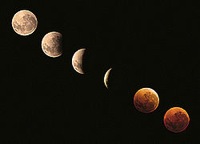Difference between revisions of "Eclipse"
m (Text replacement - "http://" to "https://") |
|||
| Line 1: | Line 1: | ||
[[File:lighterstill.jpg]][[File:Lunar_Eclipse.jpg|right|frame]] | [[File:lighterstill.jpg]][[File:Lunar_Eclipse.jpg|right|frame]] | ||
| − | An '''eclipse''' is an [[astronomical]] [[event]] that occurs when one [[celestial]] object moves into the [[shadow]] of another. The term is derived from the ancient [[Greek]] noun ἔκλειψις (ékleipsis), which is derived from the verb ἐκλείπω (ekleípō), "to cease to [[exist]],"[1] a combination of prefix εκ- (ek-), from preposition εκ, εξ (ek, ex), "out," and of verb λείπω (leípō), "to be [[absent]]".[2] [3] When an eclipse occurs within a stellar [[system]], such as the [ | + | An '''eclipse''' is an [[astronomical]] [[event]] that occurs when one [[celestial]] object moves into the [[shadow]] of another. The term is derived from the ancient [[Greek]] noun ἔκλειψις (ékleipsis), which is derived from the verb ἐκλείπω (ekleípō), "to cease to [[exist]],"[1] a combination of prefix εκ- (ek-), from preposition εκ, εξ (ek, ex), "out," and of verb λείπω (leípō), "to be [[absent]]".[2] [3] When an eclipse occurs within a stellar [[system]], such as the [https://en.wikipedia.org/wiki/Solarsystem solar system], it forms a type of syzygy—the alignment of three or more celestial bodies in the same [[gravitational]] system along a straight line.[4] |
| − | The term eclipse is most often used to describe either a solar eclipse, when the [ | + | The term eclipse is most often used to describe either a solar eclipse, when the [https://en.wikipedia.org/wiki/Moon Moon's] [[shadow]] crosses the [[Earth]]'s surface, or a lunar eclipse, when the Moon moves into the shadow of Earth. However, it can also refer to such events beyond the Earth-Moon system: for example, a planet moving into the shadow cast by one of its moons, a moon passing into the shadow cast by its host [[planet]], or a moon passing into the shadow of another moon. A [https://en.wikipedia.org/wiki/Binary_Star binary star] system can also produce eclipses if the plane of their orbit intersects the position of the [[observer]].[https://en.wikipedia.org/wiki/Eclipse] |
== External links == | == External links == | ||
| − | * [ | + | * [https://www.phys.uu.nl/~vgent/eclipse/eclipsecycles.htm A Catalogue of Eclipse Cycles] |
| − | * [ | + | * [https://www.hermit.org/Eclipse/when_search.shtml Search 5,000 years of eclipses] |
| − | * [ | + | * [https://sunearth.gsfc.nasa.gov/eclipse/eclipse.html NASA eclipse home page] |
| − | * [ | + | * [https://www.eclipses.info International Astronomical Union's Working Group on Solar Eclipses] |
| − | * [ | + | * [https://www.markstravelnotes.com/travelogues/eclipse_chasing/ Mark's eclipse chasing website] |
| − | * [ | + | * [https://xjubier.free.fr/en/site_pages/SolarEclipsesGoogleMaps.html Interactive eclipse maps site] |
===Image galleries=== | ===Image galleries=== | ||
| − | * [ | + | * [https://www.perseus.gr/Astro-Eclipses.htm Solar and Lunar Eclipse Image Gallery] |
| − | * [ | + | * [https://www.williams.edu/astronomy/eclipse Williams College eclipse collection of images] |
| − | * [ | + | * [https://www.zam.fme.vutbr.cz/~druck/Eclipse/ Prof. Druckmüller's eclipse photography site] |
[[Category: Astronomy]] | [[Category: Astronomy]] | ||
Latest revision as of 00:17, 13 December 2020
An eclipse is an astronomical event that occurs when one celestial object moves into the shadow of another. The term is derived from the ancient Greek noun ἔκλειψις (ékleipsis), which is derived from the verb ἐκλείπω (ekleípō), "to cease to exist,"[1] a combination of prefix εκ- (ek-), from preposition εκ, εξ (ek, ex), "out," and of verb λείπω (leípō), "to be absent".[2] [3] When an eclipse occurs within a stellar system, such as the solar system, it forms a type of syzygy—the alignment of three or more celestial bodies in the same gravitational system along a straight line.[4]
The term eclipse is most often used to describe either a solar eclipse, when the Moon's shadow crosses the Earth's surface, or a lunar eclipse, when the Moon moves into the shadow of Earth. However, it can also refer to such events beyond the Earth-Moon system: for example, a planet moving into the shadow cast by one of its moons, a moon passing into the shadow cast by its host planet, or a moon passing into the shadow of another moon. A binary star system can also produce eclipses if the plane of their orbit intersects the position of the observer.[1]
External links
- A Catalogue of Eclipse Cycles
- Search 5,000 years of eclipses
- NASA eclipse home page
- International Astronomical Union's Working Group on Solar Eclipses
- Mark's eclipse chasing website
- Interactive eclipse maps site
